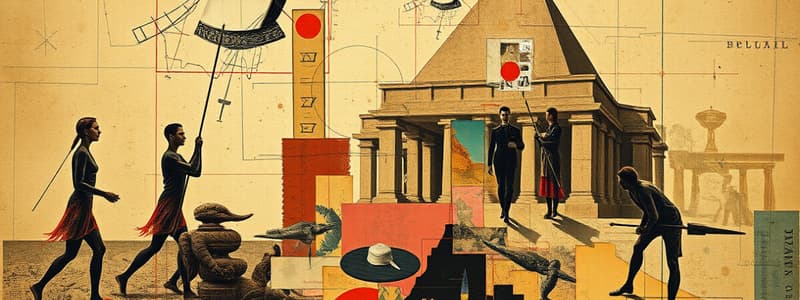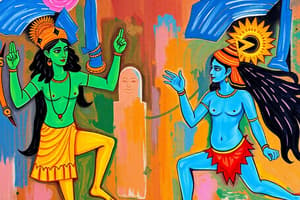Podcast
Questions and Answers
Which philosopher is known for establishing the Academy and formulating the theory of Forms?
Which philosopher is known for establishing the Academy and formulating the theory of Forms?
- Aristotle
- Socrates
- Plato (correct)
- Confucius
What is a key principle of Buddhism as established by Siddhartha Gautama?
What is a key principle of Buddhism as established by Siddhartha Gautama?
- The Four Noble Truths (correct)
- Karma
- Dharma
- Moksha
Which trade network connected the East and West and facilitated the exchange of silk and spices?
Which trade network connected the East and West and facilitated the exchange of silk and spices?
- Silk Road (correct)
- Indian Ocean Trade
- Trans-Saharan Route
- Mediterranean Trade
What does the term 'dharma' primarily refer to in Hinduism?
What does the term 'dharma' primarily refer to in Hinduism?
Which of the following is NOT typically considered a part of the class hierarchy in ancient civilizations?
Which of the following is NOT typically considered a part of the class hierarchy in ancient civilizations?
In which civilization was the development of banking systems notably seen alongside the use of coinage for trade?
In which civilization was the development of banking systems notably seen alongside the use of coinage for trade?
What role did women commonly have in patriarchal societies of ancient civilizations?
What role did women commonly have in patriarchal societies of ancient civilizations?
What major agricultural practice allowed for surplus production and subsequently urbanization in ancient civilizations?
What major agricultural practice allowed for surplus production and subsequently urbanization in ancient civilizations?
Flashcards are hidden until you start studying
Study Notes
Philosophy and Religion
-
Major Philosophical Schools:
- Ancient Greece:
- Socrates: Emphasized ethics and the Socratic method.
- Plato: Founded the Academy; theory of Forms.
- Aristotle: Focused on logic, ethics, and empirical observation.
- Ancient India:
- Hinduism: Beliefs in dharma, karma, and moksha; texts like Vedas and Upanishads.
- Buddhism: Founded by Siddhartha Gautama; Four Noble Truths and Eightfold Path.
- China:
- Confucianism: Emphasized moral integrity and social harmony.
- Taoism: Focused on living in harmony with the Tao (the way).
- Ancient Greece:
-
Religious Practices:
- Polytheism in many ancient civilizations (e.g., Egypt, Mesopotamia).
- Rituals and Sacrifices: Integral to maintaining favor with gods.
- Philosophical and Religious Texts: Key to understanding cultural values and ethics.
Economy and Trade
-
Agricultural Foundations:
- Subsistence Farming: Mainstay for most civilizations; reliance on local crops.
- Surplus Production: Enabled trade and urbanization.
-
Trade Networks:
- Silk Road: Connected East and West; trade of silk, spices, and ideas.
- Mediterranean Trade: Involved Greece, Rome, and North Africa; exchange of goods and culture.
- Indian Ocean Trade: Engaged Southeast Asia, Africa, and the Middle East; maritime routes enhanced trade.
-
Currency and Banking:
- Adoption of coinage (e.g., Lydia) facilitated trade.
- Development of banking systems in Mesopotamia and later in Greece and Rome.
Social Structure
-
Class Hierarchy:
- Elite Class: Kings, nobles, priests; controlled land and resources.
- Middle Class: Merchants and artisans; played vital roles in trade and craftsmanship.
- Lower Class: Laborers and farmers; often worked in servitude or as peasants.
-
Gender Roles:
- Patriarchal societies predominated; men held primary power.
- Women’s roles varied: some had rights in property ownership, while others had limited freedoms.
-
Slavery:
- Common in many civilizations (e.g., Rome, Greece).
- Slaves were often prisoners of war or born into servitude; essential for labor-intensive tasks.
-
Social Mobility:
- Possible in some societies (e.g., through trade success), but often limited by birth status.
Conclusion
- Classical civilizations laid the groundwork for many modern philosophical, economic, and social systems.
- Understanding these elements helps in comprehending the evolution of human societies.
Philosophy and Religion
-
Ancient Greece: Birthplace of Western philosophy, focusing on ethics and knowledge.
- Socrates: Pioneered the Socratic method; encouraged critical thinking and dialogue.
- Plato: Established the Academy in Athens; articulated the theory of Forms describing ideal realities.
- Aristotle: Contributed extensively to logic, ethics, and observational science; emphasized empirical evidence.
-
Ancient India: Developed rich spiritual and philosophical traditions.
- Hinduism: Central beliefs include dharma (duty), karma (action and consequence), and moksha (liberation from the cycle of rebirth); significant texts include the Vedas and Upanishads.
- Buddhism: Founded by Siddhartha Gautama; central teachings include the Four Noble Truths and the Eightfold Path guiding mindful living.
-
China: Influential philosophical traditions shaping ethics and governance.
- Confucianism: Stressed moral integrity, respect for elders, and social harmony; vital in government and familial structures.
- Taoism: Advocated for living in accordance with the Tao, emphasizing simplicity, nature, and harmony.
-
Religious Practices: Diverse beliefs across ancient civilizations.
- Polytheism: Common practice in ancient cultures like Egypt and Mesopotamia, worshipping multiple deities.
- Rituals and Sacrifices: Integral to maintaining divine favor, reflecting cultural values and religious observances.
- Philosophical and Religious Texts: Essential for understanding the ethics and cultural values of ancient societies.
Economy and Trade
-
Agricultural Foundations: Economic systems rooted in farming practices.
- Subsistence Farming: Predominant method, focusing on local crop production for survival.
- Surplus Production: Enabled the growth of trade and the rise of urban centers.
-
Trade Networks: Essential for cultural and economic exchange.
- Silk Road: Vital trade route connecting East and West, facilitating the exchange of silk, spices, and ideas.
- Mediterranean Trade: Involved Greece, Rome, and North Africa; significant for goods and cultural interaction.
- Indian Ocean Trade: Linked Southeast Asia, Africa, and the Middle East, enhancing maritime trade routes.
-
Currency and Banking: Innovations in trade facilitation.
- Coinage: First adopted in Lydia, simplifying trade practices.
- Banking Systems: Originated in Mesopotamia; evolved in Greece and Rome to support economic activities.
Social Structure
-
Class Hierarchy: Defined societal roles and power dynamics.
- Elite Class: Comprised of kings, nobles, and priests; held control over land and resources.
- Middle Class: Included merchants and artisans; essential in trade and production.
- Lower Class: Laborers and farmers, often living in servitude or as peasants, faced limited upward mobility.
-
Gender Roles: Varied significantly across cultures.
- Predominantly patriarchal societies; men typically held dominant positions.
- Women's rights fluctuated, with some enjoying property ownership while others faced restrictions.
-
Slavery: Common in many ancient cultures.
- Source of labor often included prisoners of war and those born into servitude; vital for fulfilling labor requirements.
-
Social Mobility: Limited but possible in certain contexts.
- Success in trade could improve social status, but birth often determined societal position.
Conclusion
- Classical civilizations established foundational philosophical, economic, and social systems still relevant today.
- Analyzing these elements provides insight into human societal evolution and contemporary structures.
Studying That Suits You
Use AI to generate personalized quizzes and flashcards to suit your learning preferences.




